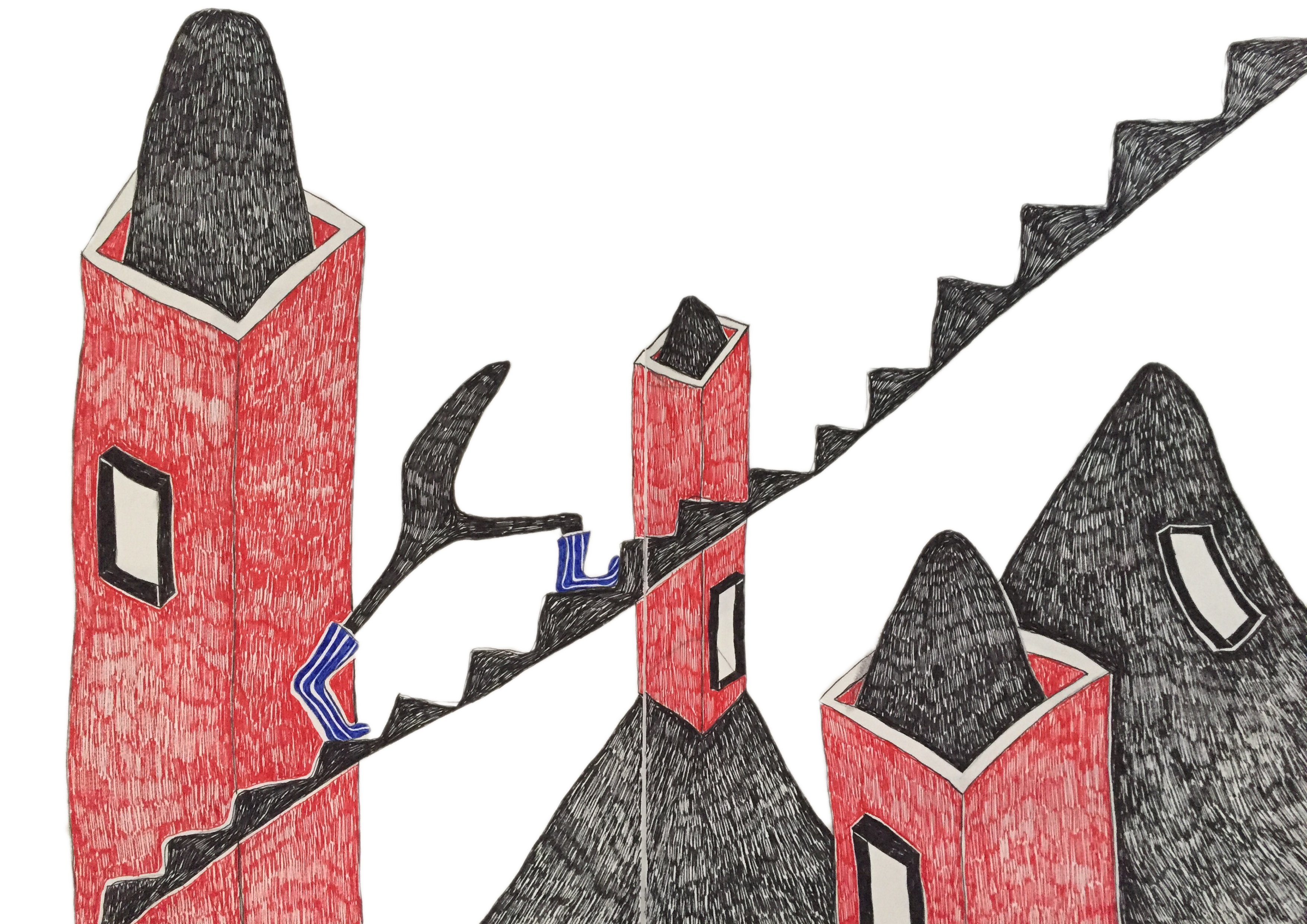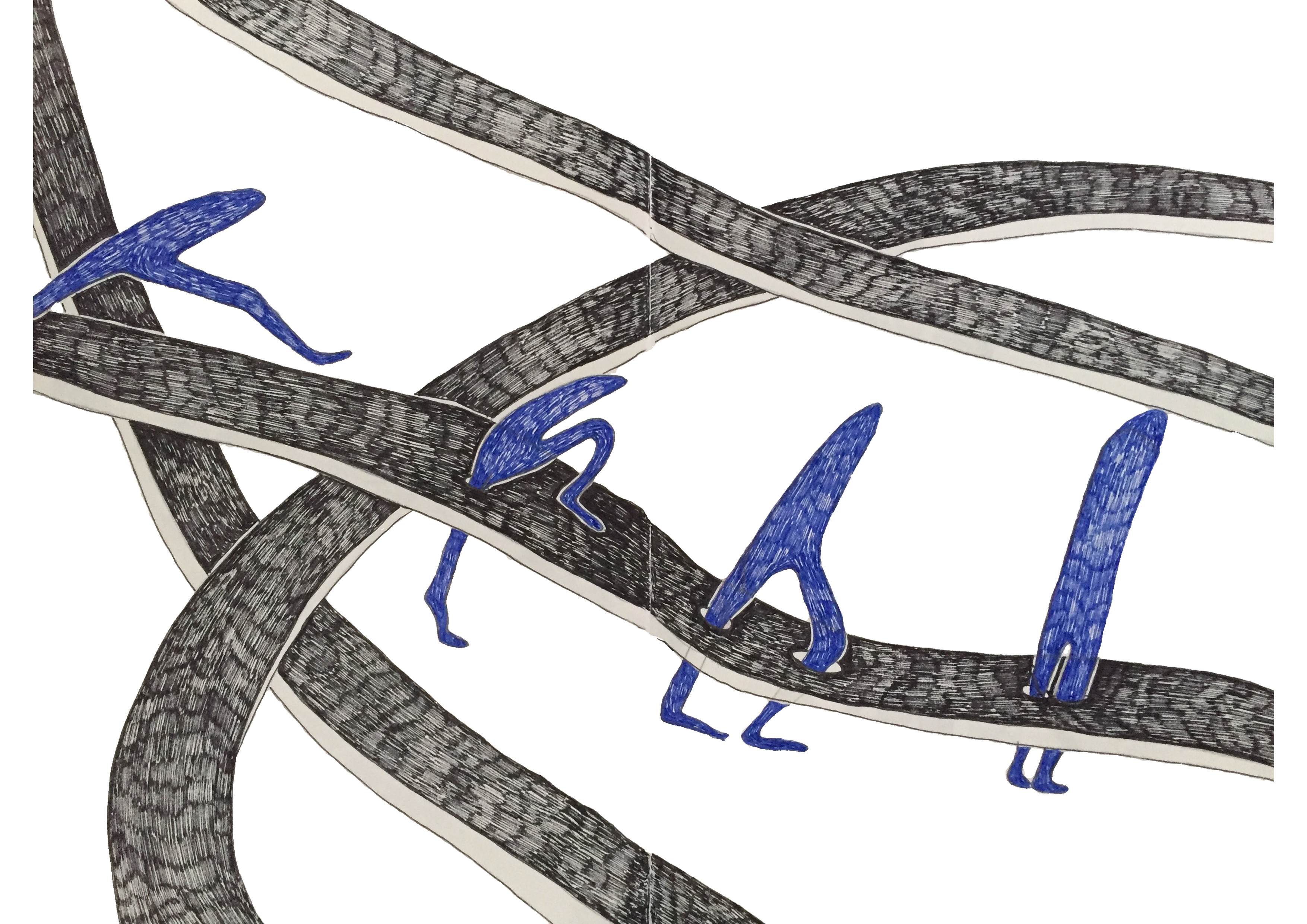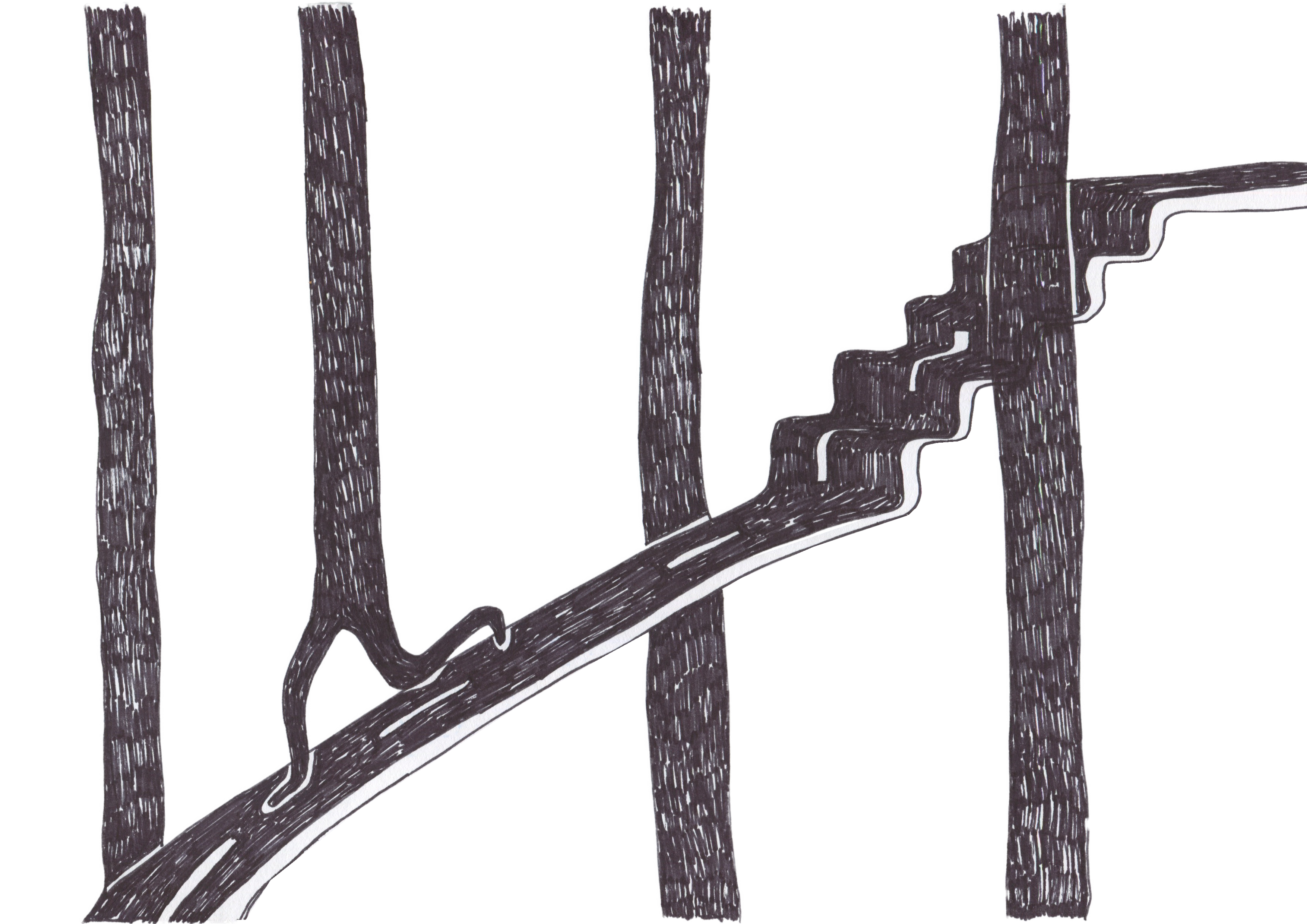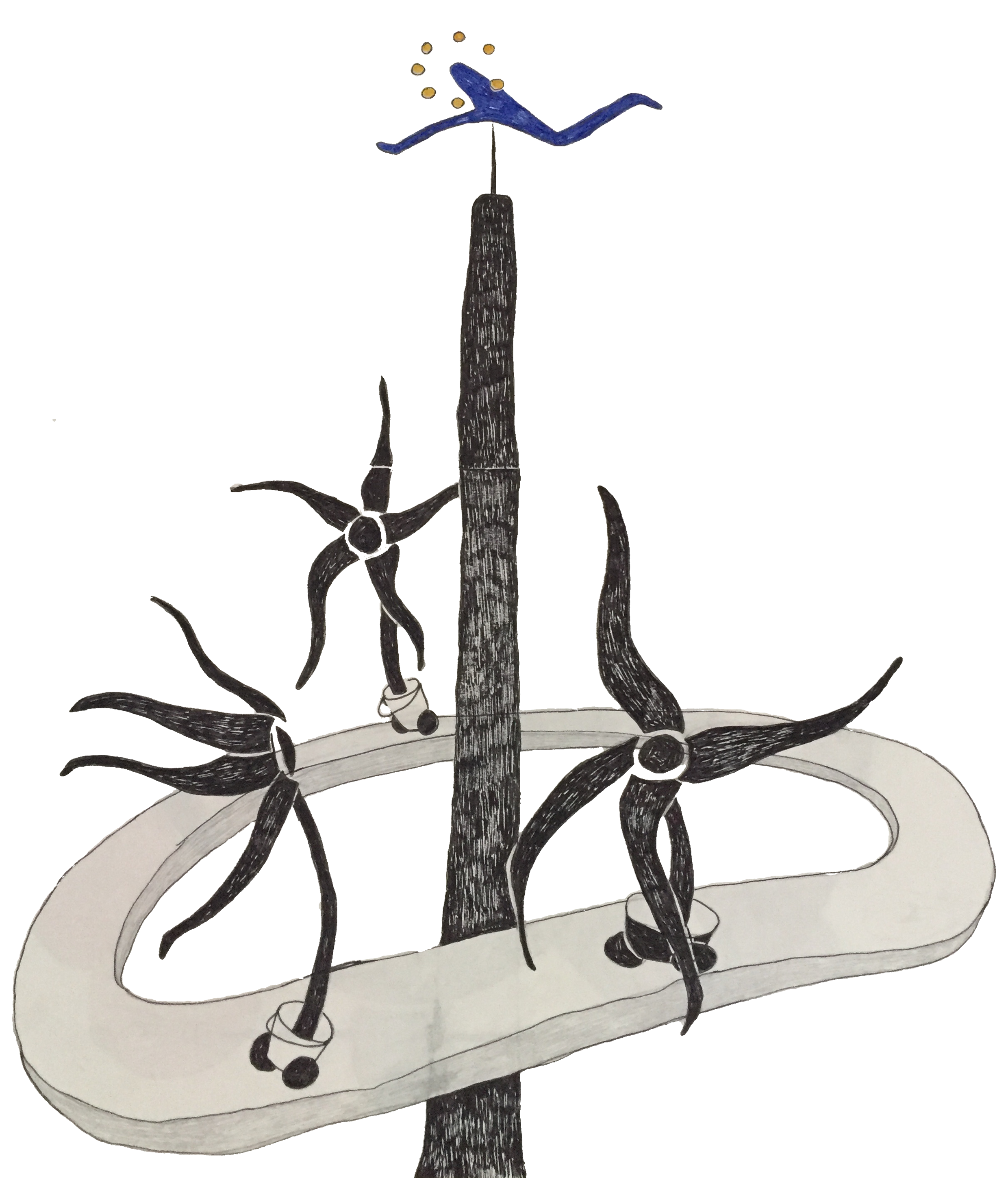Precarious Practices #3. Personal reflections in text and image on freelancing in the arts without an EU-passport.
1902 words of guilt


Precarious Practices #3. Personal reflections in text and image on freelancing in the arts without an EU-passport.
Under normal working conditions, it would take us months to arrange one of our Skypeversations. During the Corona nightlife, our appointments are of a more spontaneous nature. We throw facts at each other about stuff that happened in our lives since our last virtual meeting. ‘I’ve been feeling down, but now I’m fine. How are you and why have you been up to, to what you have been?’ Although I sometimes crave to skip this casual, factual catch-up, it always comes down to politely and keenly listening to each other’s stories. We style the conversation without the intention to dramatize the stories too much, allowing the other’s fantasy to fill the gaps. She tells me stuff; I tell her stuff. The sum of all confessions leaves me with the impression that both of our realities were a bit harsher compared to the last sum of confessions. I could predict that the resulting bitterness would act like a spice on top of what we were about to speak of next.

After a while, the facts tend to leave the virtual table of discussion, found beneath the digital smoke of our cigarettes. I feel, and I see the excitement entering the conversation. Our eyes open widely as we dive deeper into the emotional fabrics of our existence. We try to untangle the knots, by telling the big elephant in both of our rooms to stop camouflaging. Under normal working conditions, during this stage of our talk, we would turn into ‘witches’ and bring out our sleepy tendencies (feminist, pessimist, irrational, vulgar, poor but sexy), triggered by the world around us. We would bounce against the standards by expressing what we find is publicly suppressed. We would exorcise each ‘injustice’ with laughter, as an agreement and a personal victory. Under current working conditions, however, our witchcraft is on hold. It’s waiting to be triggered, to be pulled by something which is nowhere onshore. This time, sparked by internal needs, we start uncovering the guilt and fears we are forced to face, when given time to do nothing.
*** the world around us: semi-funky situations created within the circles of working gigs, gig relationships and travels to gigs in different countries. ***
Suddenly, the elephant stops camouflaging and concludes the following about my friend and me:
- As crafty freelancers, we are both eligible to get a fancy minimum wage from the government (French + Dutch);
- As crafty freelancers, we are both in flux and existentially affected by Corona;
- Without the governmental support, we could both be financially supported by our families but,
- We both decided that we don’t want to be supported by our families.
- Our favorite party is Eid Moebarak (the Bosnian version);
- There are three reasons why we feel like we’re on a holiday right now:
- We can do more work.
- If we don’t, nobody will know.
- If someone finds out about our unproductiveness, we will be excused because… crisis. Even web-developers are excused because of the crisis.
- … At the same time, we agree that, just because we are in a similarly privileged position, it doesn’t mean that our feelings of guilt are equal. Acknowledging our differences is one of the reasons why our lungs will hate us forever. Many more cigarettes contribute to the continuation of our conversation.
Inhale.
Both under normal and current living conditions, a precarious worker is always doomed to feel guilty in their own unique way.
Exhale.
While she has it all (shelter + roof + money), my friend is feeling guilty for having a lot of time to think about the French neighborhoods where the crisis settled a long time ago, and where families have no better living situations to lock themselves in. My friend is angry at the cop for fining a homeless person (3x) for being on the streets. She nervously snickered at the ridiculousness of the situation, while purchasing an e-reader online for the sake of her sanity. Yes, my friend is feeling guilty for buying an e-reader, and for enjoying the investment.
While I have it all, too (shelter + roof + money), my usual non-European guilt hugs me hard. Coming from Bosnia & Herzegovina in order to pursue an art career, I can say that I live comfortably in the city of Amsterdam. I consider myself quite integrated in and accepted by European society. But, undeniably, my passport has remained very non-European.

The pandemic brought to fore the hidden layers of my un-belonging. I experienced something close to a heart attack when masses of expats started fleeing from the Netherlands during the first two weeks of the Corona outbreak. I never had a heart attack. But yeah, it looked like they had been waiting for that one final reason to shine on them as a divine beam of light, a perfect excuse to pack up and leave. Although I find the reason legitimate, I cannot deny that my empathy is limited (to their need to return back, wherever back is).
Speaking from my non-European perspective, Europe is the same everywhere I look (within the EU). Although I am sometimes bored by its regulatory repetitiveness and always the same infosphere, I appreciate the conditions each time I pay a visit to Bosnia, where I get stabbed by the memory of why I left. So, I miss yEU whenever I find myself outside of your borders.
On the other hand, I have contemplated my reasons to leave the Netherlands too. I’ve nourished them in my head for a long time; but with a well-crafted discipline, I must admit that I have successfully suppressed that desire.
I repeat, the pandemic enhanced the hidden layers of my un-belonging. Again and again, I find myself re-defining the meaning and location of a triangle-roofed house from the drawing which for so long, defined home. What’s the point of feeling nostalgic? Should I go back? – I admit that I like to miss (that’s an excuse I settle for). Even though I’m dying to be with the ones surrounding the triangle-roofed house in the drawing, the Corona outbreak didn’t spark the urge to go back to the image. I told my friend: ‘If there’s anything I’m anxious about now, it’s the lack of desire to go back home.’ But the feeling didn’t last long. The anxiety was soothed as the borders closed down; the silence after the rush became a different kind of pain.
*** ticklish internal needs: pulling out the tear-wet layers of guilt and non-guilt, letting them dry before one’s eyes, while simultaneously accepting the future of wearing them. ***

[the conversation ended; I wake up to a different day]
I gaze out from my balcony while listening to Aphex Twin.[1] Through the digital noise, I try to listen to myself. The mixture of noise and my thoughts become the background music to the image playing out in front of me. Other people are on their little balconies too. They are unsuspiciously reading the news, drinking, working out, and busying themselves with the things that have already been capitalized by someone, somewhere.
As the stillness of my surroundings starts to sound interesting, I ask myself: ‘What am I trying to hear this time? A memory? Probably. Internal fear(s)? Maybe, too. Something along both lines.’
I know that a quest for answers would bring back last night’s anxieties. Unlike normally, the idea of feeling guilty bores me this time. I change my thinking strategy and indulge myself in solution-oriented fantasies, powered by the Netherlands:
In case of crisis or emergency, first make sure that you saw the crisis coming and that now you’re prepared for its shocking effect. Prior to anything happening, imagine what could be a potential catastrophe. Think of strategies to deal with the catastrophe, then think of solutions. Think of plan B solutions. Plan C solutions wouldn’t hurt in this case. In this way, whatever happens, you will not be surprised. And mind your step.
Once applied to life and personal angst today, the fantasies go into further detail. The catastrophe I imagine is a funeral of my loved one back home. I am confronted by the following questions: How will I travel? What would be a perfect timing for the occasion? How much savings do I have (I know the answer to that)? Whom to ask for money? Which family member to contact for the funeral? Which rituals must be included in the funeral ceremony? Who will do the graphic design for the announcements? Is there a budget for that? Whom to invite? Will my European friends come? Whom to rely on?
By the time I asked myself all of these questions and wrote them down, it was too late to deny having them. If this happening could potentially kill my emotional stability, I thought I’d better prepare for its shock effect. So that when it shocks, it doesn’t shock too much. And if none of this becomes more than a catastrophic scenario in my head, I can only consider myself to be lucky.

I listen to the sound of my social status (again): an artist, a writer, and – there was something else. A clock is ticking loudly in my head. Whatever happens behind this insecurity is well defined in my ZZP business history. Being a ZZP’er gives a reason for guilt to grow. Without long-term financial security, my fears make me believe that obtaining European documents matters to me more than my despair to go home. But, honestly, having great ideas for great projects ahead of me is not enough to feel safe about the future. And if all of this would be consequential to me only, and not to my family members back home as well, I probably wouldn’t feel as guilty to have chosen the career of flux.
I rewind and listen to the sound tape of my integration. It sounds like binge-scrolling down the news feed for hours in a complete silence. After years of dwelling in the limitations of almost being an EU citizen, but never quite there, I can proudly say that I’ve built a good relationship with my fears. They became good friends of mine. I take them for a walk, and we pretend to be privileged together; that we’ve built a very long working history together and that, now, it’s all paying off. We pretend that we’ve grown immune to pain and that we will go fishing together soon. We strictly avoid thinking about the cons of wanting to officially integrate into Europe, and save it for future ponders.
Q to myself: What needs to be re-thought?
A to myself and to others: Who’s asking and who’s answering?
I focus on what I’m gazing at from my balcony. Other balconies, inhabited by an occasional kick-boxer, tanning early birds, a daytime love story, The Brunch Society, BBQ-keeper, punch drunk love, a loudly bored dog, and the gardener. Thrown across a panoptic building, our gazes cannot not meet. From that gaze, it looks like we all agree to what’s going on here. It looks like we are holding our urban hyperactivity on a leash, hoping it won’t get restless enough to break the leash. No matter how shaky the situation feels, we’re all waiting for the world to give us a green light to start distracting ourselves.

A smoker in a suit comes out on his balcony and smokes a cigarette.
[1] haha.